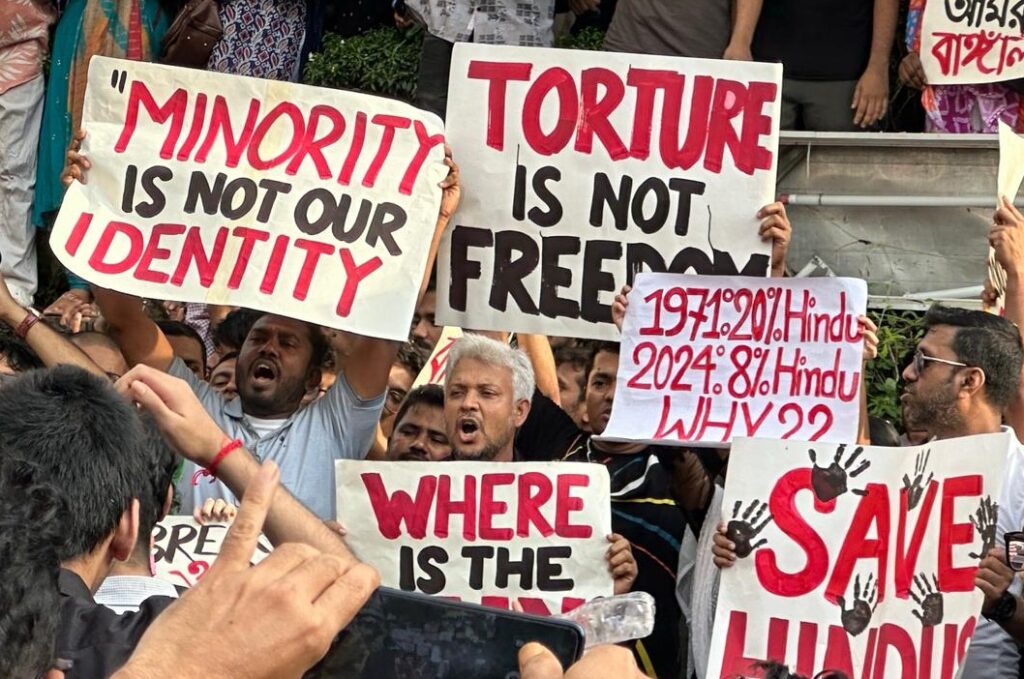Bangladesh in Crisis: Minorities Under Attack as Political Turmoil Engulfs Nation
Share

Bangladesh is facing a grave humanitarian crisis as violence against religious and ethnic minorities has surged following the resignation of Prime Minister Sheikh Hasina on August 5th. The fall of Hasina’s government amid widespread protests has unleashed a wave of attacks targeting the country’s Hindu, Buddhist, and Christian communities, threatening to unravel decades of progress in fostering communal harmony and secular democracy in the Muslim-majority nation. According to reports from prominent minority rights organizations, at least 205 incidents of persecution against minorities have been documented across 52 districts in the week since Hasina’s departure. The Bangladesh Hindu Buddhist Christian Unity Council and the Bangladesh Puja Udjapan Parishad released these alarming figures in an open letter to Nobel laureate Muhammad Yunus, who was recently sworn in as head of an interim government tasked with stabilizing the volatile situation.
The scale and intensity of the violence is deeply troubling. Hindu temples, homes, and businesses have been vandalized and looted. Women have faced assault, and at least two Hindu leaders affiliated with Hasina’s Awami League party have been killed. The total death toll from the unrest has climbed to over 560 since mid-July when protests against a controversial job quota system began escalating. Nirmal Rosario, a president of the unity council, described the dire circumstances faced by minority communities: “We seek protection because our lives are in a disastrous state. We are staying up at night, guarding our homes and temples. I have never seen anything like this in my life.” The climate of fear and insecurity has driven thousands to stage protest rallies in major cities like Dhaka and Chattagram, blocking traffic for hours as they demand government action to restore safety and communal harmony.
The targeted nature of the attacks against Hindus, who comprise about 8% of Bangladesh’s population, is particularly concerning. Historically, the Hindu minority has supported Sheikh Hasina’s secular Awami League party over opposition groups that include hardline Islamist factions. This political alignment appears to have made them vulnerable in the power vacuum left by Hasina’s sudden departure. While some political leaders have sought to downplay the sectarian elements of the violence, the pattern of attacks leaves little doubt that extremist elements are exploiting the chaos to target minority communities.
The interim government led by Muhammad Yunus faces mounting pressure to swiftly restore law and order and protect vulnerable communities. Yunus has condemned the attacks as “heinous” and urged student protesters to help safeguard Hindu, Christian, and Buddhist families. However, concrete action to curb the violence and hold perpetrators accountable has been slow to materialize. The situation has drawn international condemnation and calls for intervention. The United Nations has spoken out against the racially and religiously motivated attacks, with UN Secretary-General Antonio Guterres’ spokesperson Farhan Haq stating, “We stand against any racially based attacks or racially based incitement to violence.” Indian-American lawmakers have appealed to US Secretary of State Antony Blinken to press the Bangladeshi government to end the persecution of minorities. The roots of the current crisis lie in long-simmering political and social tensions that boiled over in recent weeks. While the protests that led to Hasina’s resignation focused on reforming the quota system in government jobs, they tapped into broader discontent with corruption, authoritarianism, and economic challenges. The abrupt collapse of Hasina’s government created a power vacuum that extremist elements have eagerly exploited.
The attacks on minorities represent a dangerous backsliding for a country that has made significant strides in recent decades to overcome its history of communal violence. Bangladesh’s constitution enshrines secularism as a founding principle, and governments have worked to promote religious tolerance and protect minority rights. The current wave of violence threatens to erode this progress and revive old wounds. Of particular concern is the potential for the violence to spiral further out of control or become entrenched. Bangladesh has previously experienced periods of protracted communal conflict, most notably during the 1971 war for independence. The international community must remain vigilant and proactive in supporting efforts to de-escalate tensions and protect vulnerable groups.
The interim government faces a monumental task in restoring stability and communal harmony. Immediate priorities should include deploying security forces to protect minority communities, swiftly investigating and prosecuting those responsible for attacks, and initiating a national dialogue to address underlying grievances and promote reconciliation. Longer-term, Bangladesh’s political class must recommit to the principles of secularism, pluralism, and equal rights for all citizens regardless of religion or ethnicity. Educational initiatives to promote tolerance and interfaith understanding will be crucial. The country’s vibrant civil society and student movements, which played a key role in recent protests, can be powerful voices for communal harmony if properly engaged.
The international community also has an important role to play in supporting Bangladesh through this crisis. Diplomatic pressure on the interim government to protect minorities and uphold human rights is essential. Humanitarian aid may be needed to assist those displaced or impacted by the violence. International human rights observers could help document abuses and support accountability efforts. As Bangladesh navigates this perilous transition, the world must not look away. The country’s future as a secular democracy hangs in the balance. Failure to decisively reject communal violence and protect minority rights risks emboldening extremists and plunging the nation into a darker era of sectarian conflict. With principled leadership, robust civil society engagement, and international support, Bangladesh can emerge from this crisis with its commitments to pluralism and equal rights reaffirmed and strengthened. The coming weeks and months will be critical in determining which path the nation chooses.







